“We’re going to throw everything at this” remarked Labour Leader Sir Keir Starmer in Leith last month. Describing his pledge to decarbonise the power sector by 2030 as “the biggest opportunity we’ve had in decades to make this country work for working people”.
Much has changed the past week. The recent Uxbridge by-election and focus on the Ultra-Low Emission Zones (ULEZ) have ignited a wider political debate about the UK’s transition to net zero.
Some say we must be “pragmatic and proportionate”. That in the middle of a cost of a living crisis, it is time to “cut the green crap” and ensure that we don’t “add onto bills”. This week the Conservative have attempted to frame Labour’s policy of no new licenses as an “energy surrender plan”. Yet the truth is, the political battle for net zero is only just beginning.
The debate is not whether we transition to net zero, but how
Let us be clear on the facts. As the Office for Budget for Responsibility has shown, delaying action on net zero by a decade would double the costs to the UK economy. Recent FT analysis of data from YouGov has shown that Britons are generally more supportive of green transition policies than people in peer countries such as Germany, the US and France.
The question is not whether we transition to net zero per se, but in how we implement the transition. Labour should heed the lessons of the ULEZ backlash – the political price for poorly designed green transition policies is high. Better to have enabled people to keep current their existing car or van exempt from the outer ULEZ charge.
ULEZ is just one of a multitude of decisions that policymakers face on the road to decarbonise Britain. Decisions loom this decade about how we heat our homes to moving to electric vehicles for private and public transport. Labour faces a strategic choice here. Accept the “green crap” as a fait accompli? Or offer a credible alternative, one that doesn’t accept this “sticking plaster” politics. Make the transition to net zero a national mission of a Labour Government. How? Based on three key fundamental principles.
Three principles for Labour
First, show, not tell. The focus on jobs is the right approach. However, significant audience research shows that the link between the green transition and jobs is not obvious to most Britons, particularly those in the “persuadable middle”. If Labour is to successfully counteract the question, “why action now”, it needs to work with industry to showcase the tangible job benefits the UK stands from competing in the global race for clean growth. And communicate these stories, constituency by constituency, doorstep by doorstep. From jobs in Scottish Ports building the future of the UK’s floating offshore wind sector, to the benefits of carbon capture and hydrogen in Southampton from the Solent Cluster. By showing that if you can make your home energy efficient or install a solar panel, clean energy can pay your bills and save you money.
Second, give citizens informed choices about the transition. The current Government has set an “ambition” to phase out all new and replace existing gas boilers from 2026 to 2035, while a ban is due on the sale of new petrol and diesel cars after 2030. A look to Germany should provide a cautionary tale for Labour on bad policy implementation. The German greens had proposed a de facto ban on new fossil boilers from 2024. This caused a backlash from those on the right, media commentators, who believed the plan will translate to higher investment costs for homeowners. Following in-fighting in Germany’s three-party ruling coalition, the original proposal has been amended and is likely to be revised by the Parliament in the coming weeks ahead. What lesson should a prospective Labour Government draw from this example? That to achieve political acceptance for the transition, particularly amongst those poorest in society, Labour must have a pragmatic and proportionate approach to policy implementation on net zero. Driving up heat pump deployment for instance will require the broadest and most imaginative policy toolbox possible. From an effective marketing campaign to boost public awareness, training programmes for installers to grants for low-income households that go beyond the current Boiler Upgrade Scheme, such as currently deployed in France and Germany.
Thirdly, give the right signals for industry. Making Britain a clean energy superpower will require a mission-led Labour Government harnessing the innovation and expertise of the private sector. It will need to be relentlessly focused on delivery, and on the right energy policy decisions in the first 100 days that will help better catalyse private sector investment. Whether it is green-lighting the next wave of UK carbon capture cluster projects, evolving the Contracts for Difference mechanism for offshore wind, or bringing clarity as to how the proposed national champion GB Energy will interact with the market. For instance, will it be a co-investor in the next wave of technologies for the UK’s energy transition, such as tidal, energy storage, or developing an interconnected energy grid across the North Sea? When will a shadow board for GB Energy be appointed to bring forward a business plan with priorities matched to funding available?
Now is the time for mission-led government
At this time, I am reminded of my experience of working on the COP26 summit in Glasgow two years ago. Then, the UK brought the world together in firing the starting gun on a global green industrial revolution, recognising that economic growth and the net zero transition are two sizes of the same coin. The UK’s transition to net zero is now at a crucial crossroads. There is no hard and fast rule that says Labour needs to “cut the green crap” as the status quo. The time calls for a mission-led Labour Government, being pragmatic and proportionate in implementing the transition to net zero. The prize on offer is clear – cut bills, create jobs and provide energy security for Britain.

